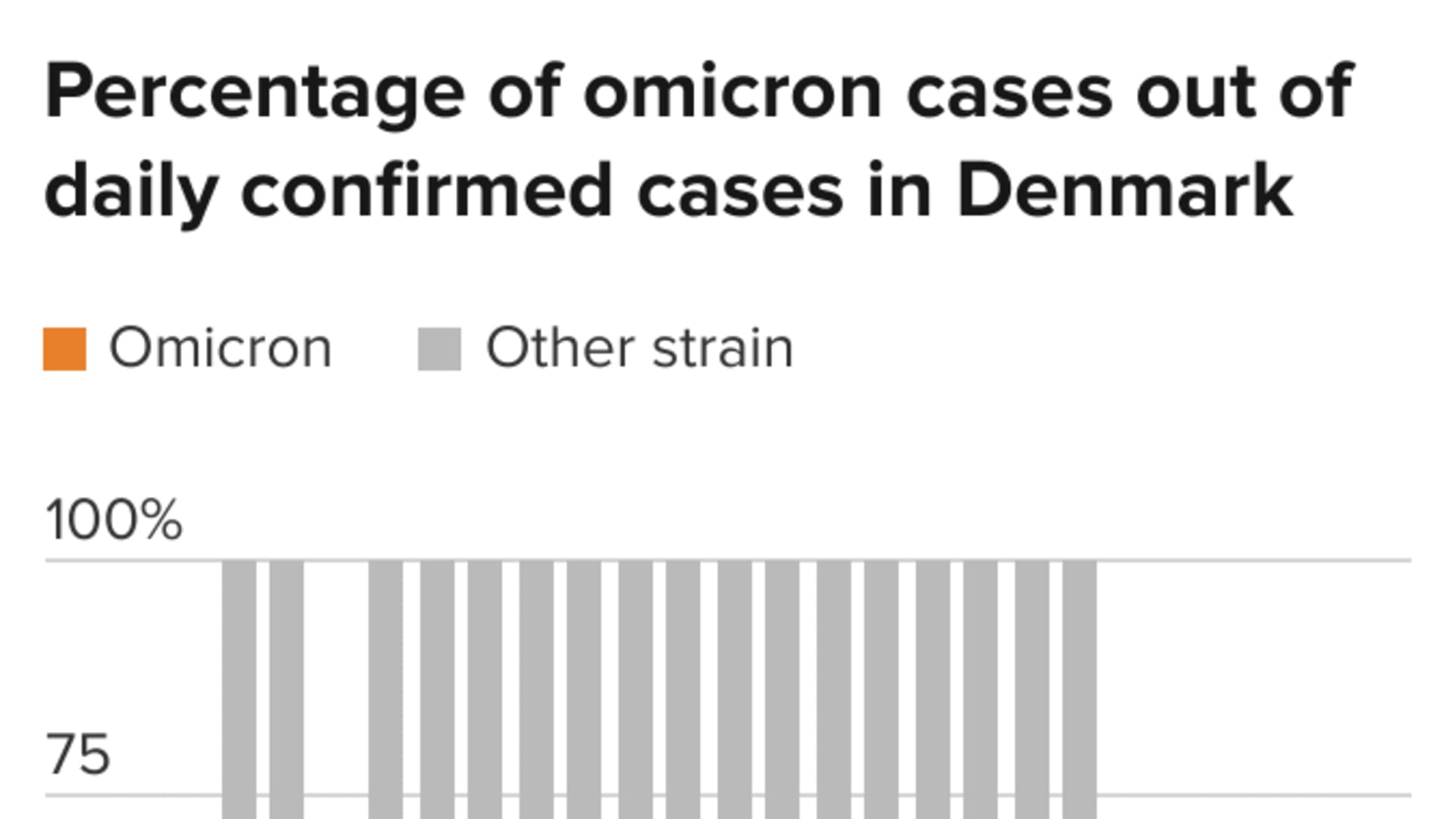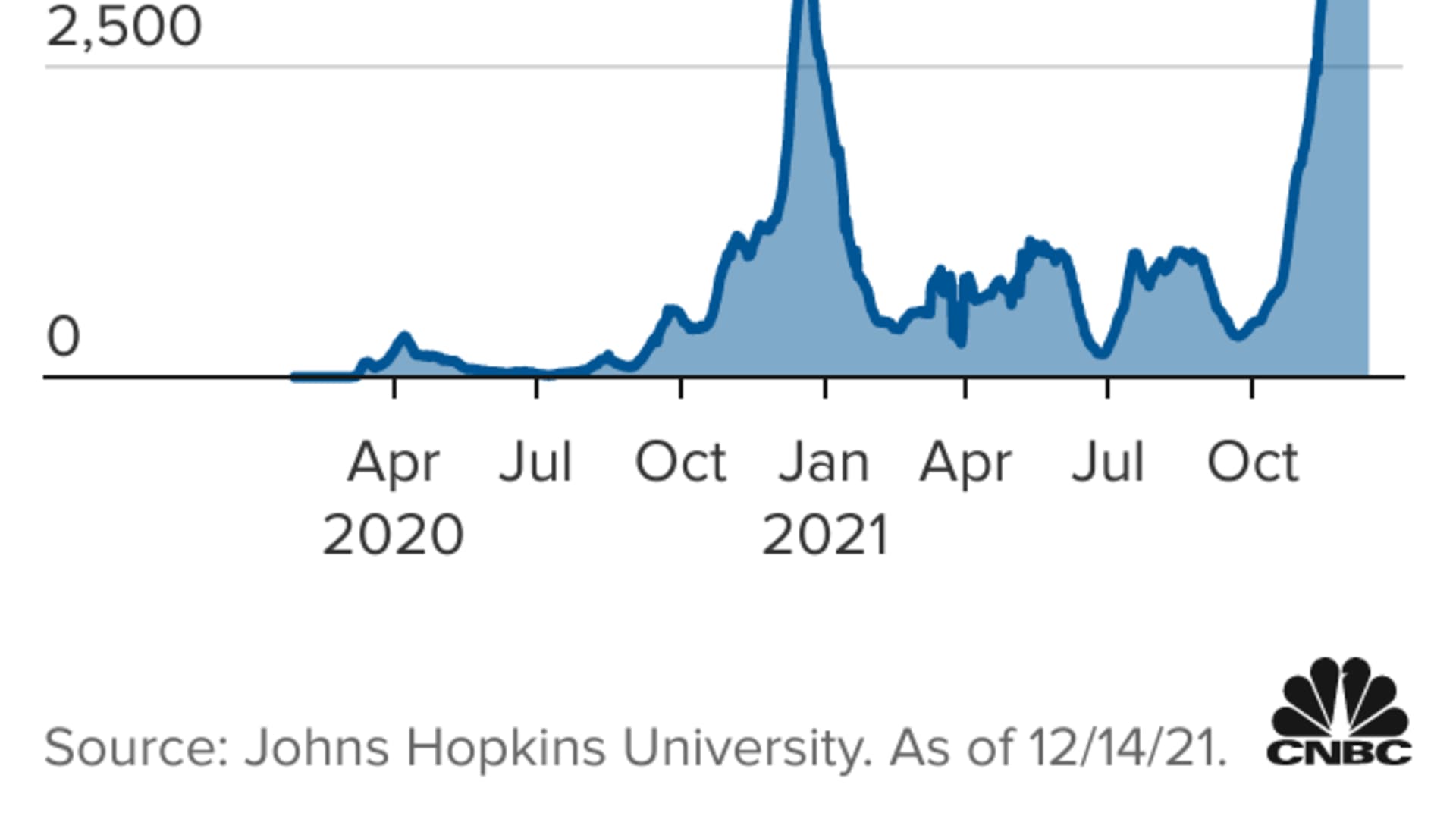
- Omicron cases are doubling every two days in Denmark, with variant expected to overtake delta in the next week, according to the Statens Serum Institut in Copenhagen.
- The rapid spread of omicron in Denmark, where 80% of the population is vaccinated, is an ominous sign for the U.S.
- Dr. James Lawler, an infectious disease expert at the University of Nebraska, said the U.S. has just weeks to take action to stem omicron.
Denmark expects the omicron Covid-19 variant to overtake delta within a week as the number of cases of the new strain doubles every two days, according to the Statens Serum Institut in Copenhagen, which conducts infectious disease surveillance for the Scandinavian nation.
WATCH ANYTIME FOR FREE
>Stream NBC10 Boston news for free, 24/7, wherever you are. |
Troels Lillebaek, chairman of Denmark's Covid variant assessment committee, told CNBC on Tuesday that omicron now represents at least 10% of sequenced Covid cases, a rapid jump from late November when there was not a single sequenced omicron case in Denmark.
"What we are seeing in Denmark is this very steep increasing the number of omicron cases every day actually, we're seeing a doubling every second day," said Lillebaek, who is also a director at one of Statens surveillance labs and a professor at the University of Copenhagen. "And within a week, omicron will take over and be the dominant variant in Denmark."
Get updates on what's happening in Boston to your inbox. Sign up for our >News Headlines newsletter.
Lillebaek said 75% of the country's omicron patients are fully immunized with a two-dose vaccine, while 9% of omicron positive patients have received a booster dose.
"We believe that what we are seeing in Denmark is not a special Danish phenomena," said Lillebaek "We can't see any reason it should be special for Denmark, what we are observing, and now we also get the same reports, very severe reports from the U.K."

The rapid spread of omicron in Denmark, where 80% of the population is fully vaccinated, is an ominous sign for the U.S., where just 61% of the population is fully vaccinated and tens of million of people still have not received a single shot. Dr. James Lawler, an infectious disease expert at the University of Nebraska Medical Center, said the U.S. has just weeks to take action to stem a wave of omicron infection.
Money Report
"We're going to be in trouble," Lawler told CNBC on Monday. "We've already got our hands full with delta. What we're probably going to get is the triple whammy of delta, omicron and seasonal influenza."
Scientists and public health officials are still researching whether omicron causes more mild or more severe disease compared with delta. So far, about 99% of omicron patients in Denmark have not been hospitalized, according to data from Statens Serum Institut. However, hospital admissions are expected to jump over the holidays.
Denmark, in a worst case scenario, is projecting 500 new Covid hospital admissions every day around Christmas in a country of 5.9 million people, according to Lillebaek. As of Wednesday, there were a total of 508 people hospitalized with Covid nationwide, according to Danish government data.

"There will be a lot of [hospital] admissions and the concern now is that many hospital staff will test positive and have to go home in isolation," Lillebaek said. "There will always be vulnerable part of the population. Some get chemotherapy, some have an immune defect, perhaps biological treatment for rheumatism."
The World Health Organization on Tuesday warned countries against dismissing omicron as a mild variant. Omicron is spreading faster than any other previous strain of the virus, according to the WHO.
While the U.S. has not yet experienced an explosion of omicron cases as in Denmark, the variant is quickly gaining ground across America. The Centers for Disease Control and Prevention on Tuesday reported that omicron represented 2.9% of sequenced Covid cases last week, up from 0.4% the week prior. Delta makes up about 97% of sequences Covid cases, according the CDC.
CDC Director Rochelle Walensky said on Wednesday that omicron may represent up to 13% of cases in states like New York and New Jersey.
"Unless it is dramatically milder and less prone to cause hospitalization, it is very likely going to just cause a sheer number of infections where you will see enough hospitalizations to significantly strain or even over run health systems," Lawler said.
The U.S. cannot eliminate transmission of the virus, Lawler said, but there are measures the nation can take to limit hospitalizations. That includes vaccinating everybody in the country over the age of 5 and making sure everyone who is eligible for a booster gets one.
Pfizer and BioNTech published preliminary data last week showing omicron significantly reduces the ability of the two-dose vaccine to ward off infection. However, two doses may still prevent severe disease, the companies said. Booster shots provide significant protection against infection, according to the lab data.
Lawler said mitigation measures such as wearing masks in indoor public places and limiting indoor gatherings as well as close contact can also help stem the tide. "You know, there's that old saying — 'hope is not a plan.' Right?" Lawler said.
However, the reintroduction of mitigation measures in the U.S. has proven politically controversial. While New York and California have reintroduced mask mandates, Texas and Florida have banned local governments and school boards from implementing them. Colorado Gov. Jared Polis on Friday declared "the emergency is over" and said mask mandates are no longer necessary due to the wide availability of vaccines.
At the federal level, President Joe Biden's vaccine requirements for federal contractors and private businesses are currently blocked by federal courts. The president has ruled out lockdowns, relying instead on vaccination and widespread testing this winter.
Denmark, on the other hand, has implemented a number of measures to stem the wave of infection. The national government is encouraging people to work from home and primary school children will attend class virtually through Jan 4. Masks are required in most indoor public spaces. Nightclubs are closed while bars, restaurants and cafes must shut their doors at midnight. People are required to present Covid passes, proving they are vaccinated, have received a recent negative test or recovered from previous infection, to enter many businesses.
The United Kingdom has also hit the alarm, raising its Covid threat assessment to level 4 on Sunday, a step below the highest warning. Prime Minister Boris Johnson on Monday said omicron is resulting in hospitalizations and confirmed the U.K. first death from the variant. He warned that Britain faces a "tidal wave" of omicron infections.
U.K. Health Secretary Sajid Javid told the BBC on Monday that omicron is spreading at a "phenomenal rate" with cases doubling every few days. England is urging people to work from home, mandating masks in most indoor public spaces, and requiring proof of two vaccine doses before entering nightclubs and large events.
On Wednesday, the U.K. reported the highest number of new Covid cases since the pandemic began.
CDC Director Rochelle Walenksy said she does not believe the U.S. will follow the same timeline as the U.K. on omicron. "I don't expect will be on the same time horizon as U.K. and we're continuing to follow cases and we'll look at that carefully," she said during a White House Covid update on Friday.
However, Michael Osterholm, , director of the Center for Infectious Disease Research and Policy at the University of Minnesota, told CNBC last week that omicron will overtake delta in the U.S. soon.
"It's just a matter of time before omicron becomes the dominant variant here, and I think that could happen relatively quickly," Osterholm told CNBC last week.
Dr. Mike Ryan, executive director of the WHO health emergencies program, said Tuesday that countries need to start preparing their health-care systems for omicron now. He said governments should make sure their health systems have enough staff, triage and oxygen supplies in place.
"Health systems are weaker now than they were a year ago in reality," Ryan said. "So unfortunately, sometimes you can get up after the first punch, but it's very hard to get up after the second."






